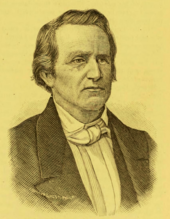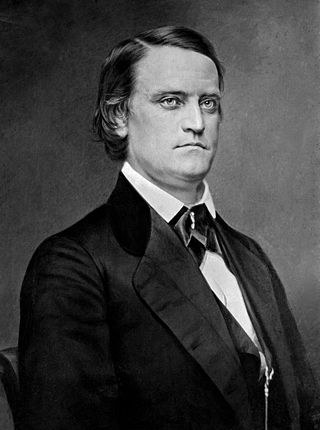
John Cabell Breckinridge was an American lawyer, politician, and soldier. He represented Kentucky in both houses of Congress and became the 14th and youngest-ever vice president of the United States. Serving from 1857 to 1861, he took office at the age of 36. He was a member of the Democratic Party, and ran for president in 1860 as a Southern Democrat. He served in the U.S. Senate during the outbreak of the American Civil War, but was expelled after joining the Confederate Army. He was appointed Confederate Secretary of War in 1865.
John Fowler was an American planter and political leader in Virginia and Kentucky. He was a Jeffersonian Democrat who served as a Democratic-Republican member of the United States House of Representatives from Kentucky in the United States Congress from 1797 to 1807. Fowler was also an early settler and civic leader in Lexington, Kentucky.

John Breckinridge was an American lawyer, slave-owning planter, soldier, and politician in Virginia and Kentucky. He served several terms each in both state's legislatures before legislators elected him to the U.S. Senate. He also served as United States Attorney General during the second term of President Thomas Jefferson. He is the progenitor of Kentucky's Breckinridge political family and the namesake of Breckinridge County, Kentucky.

James Garrard was an American farmer, Baptist minister and politician who served as the second governor of Kentucky from 1796 to 1804. Because of term limits imposed by the state constitution adopted in 1799, he was the last Kentucky governor elected to two consecutive terms until the restriction was eased by a 1992 amendment, allowing Paul E. Patton's re-election in 1999.
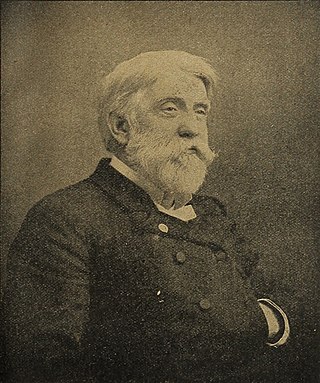
William Campbell Preston Breckinridge was a lawyer and Democratic politician from Kentucky; a U.S. Representative from 1885 to 1895. He was a scion of the Breckinridge political family: grandson of Senator John Breckinridge, and first cousin of Vice President John C. Breckinridge.

The history of slavery in Kentucky dates from the earliest permanent European settlements in the state, until the end of the Civil War. In 1830, enslaved African Americans represented 24 percent of Kentucky's population, a share that had declined to 19.5 percent by 1860, on the eve of the Civil War. Most enslaved people were concentrated in the cities of Louisville and Lexington and in the hemp- and tobacco-producing Bluegrass Region and Jackson Purchase. Other enslaved people lived in the Ohio River counties, where they were most often used in skilled trades or as house servants. Relatively few people were held in slavery in the mountainous regions of eastern and southeastern Kentucky; they served primarily as artisans and service workers in towns.
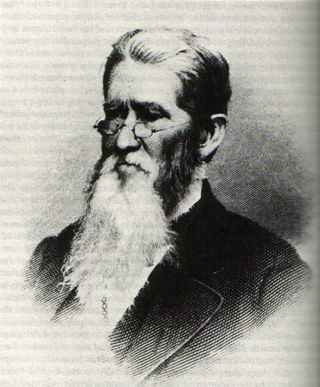
Robert Jefferson Breckinridge was a politician and Presbyterian minister. He was a member of the Breckinridge family of Kentucky, the son of Senator John Breckinridge.
Joseph J. Bullock was a Presbyterian clergyman who served as Chaplain of the Senate of the United States from 1879 until 1883.
Joseph Cabell Breckinridge was an American lawyer, soldier, slaveholder and politician in Kentucky. From 1816 to 1819, he represented Fayette County in the Kentucky House of Representatives, and fellow members elected him as their speaker. In 1820, Governor John Adair appointed Breckinridge Kentucky Secretary of State, and he served until his death.
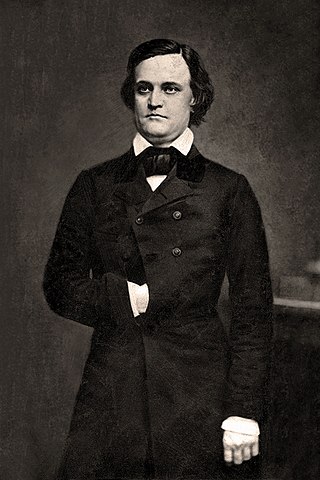
The political career of John C. Breckinridge included service in the state government of Kentucky, the Federal government of the United States, as well as the government of the Confederate States of America. In 1857, 36 years old, he was inaugurated as Vice President of the United States under James Buchanan. He remains the youngest person to ever hold the office. Four years later, he ran as the presidential candidate of a dissident group of Southern Democrats, but lost the election to the Republican candidate Abraham Lincoln.

Lewis Warner Green was an American Presbyterian minister, educator, and academic administrator who was the president of Hampden–Sydney College, Transylvania University, and Centre College for various periods from 1849 to 1863. Born in Danville, Kentucky, baptized in Versailles, and educated in Woodford County, Green enrolled at Transylvania University but transferred to Centre College to complete his education. He graduated in 1824 and in doing so became one of two members of the school's first graduating class. After short periods studying medicine and law, he enrolled at Princeton Theological Seminary in 1831 but returned to Kentucky in 1832 before graduating. The occasion of his return was his election as professor of political economy and belles-lettres; he taught for two years, and became licensed as a preacher during that span, before taking a two-year leave of absence to travel to Europe. Some time after returning, he was elected by the Synod of Kentucky to be professor of oriental and biblical literature at Hanover College, though he stayed there for only one academic year before returning to Centre in 1839 to resume his prior teaching positions and take the office of vice president.
Jeremiah Chamberlain (1794–1851) was an American Presbyterian minister, educator and college administrator. Educated at Dickinson College and Princeton Theological Seminary, he served as the president of Centre College in Kentucky from 1822 to 1825.

John Clarke Young was an American educator and pastor who was the fourth president of Centre College in Danville, Kentucky. A graduate of Dickinson College and Princeton Theological Seminary, he entered the ministry in Lexington, Kentucky, in 1828. He accepted the presidency of Centre College in 1830, holding the position until his death in 1857, making him the longest-serving president in the college's history. He is regarded as one of the college's best presidents, as he increased the endowment of the college more than five-fold during his term and increased the graduating class size from two students in his first year to forty-seven in his final year.

Ormond Beatty was an American educator and academic administrator. He was the seventh president of Centre College in Danville, Kentucky. An 1835 graduate of Centre, Beatty became a professor the following year and taught chemistry, natural philosophy, mathematics, metaphysics, biblical history, and church history over the course of his career. He was selected to fill the position of president pro tempore following the resignation of William L. Breckinridge in 1868 and was unanimously elected president by the board of trustees in 1870. He was Centre's first president who was not a Christian minister, and he led the school until his resignation in 1888, at which point he taught for two additional years before his death in 1890. Beatty also involved himself in religious affairs, serving as a ruling elder in the First and Second Presbyterian Churches in Danville, as a commissioner to three Presbyterian Church General Assemblies, and as a trustee of the Danville Theological Seminary.

James McChord or M'Chord was an American Presbyterian minister and educator. He was educated at Transylvania University and the Associate Reformed Theological Seminary and began his ministry in Lexington, Kentucky, in 1813. Two years later, he founded what would later become Lexington's Second Presbyterian Church and served as its pastor until 1819. He taught and was a member of the Board of Trustees at Transylvania from 1813 to 1819, and he was elected to serve as the first president of Centre College in Danville, Kentucky, in March 1820 but died nearly three months later before officially assuming the position.

William Clarke Young was an American minister, educator, and academic administrator who was the eighth president of Centre College in Danville, Kentucky, from 1888 until his death in 1896. The son of Centre's fourth president, John C. Young, William attended Centre and the Danville Theological Seminary, graduating in 1859 and 1865, respectively. He had a 23-year career in the ministry, serving congregations in Kentucky, Indiana, and Illinois, before returning to Centre to accept the presidency following the resignation of Ormond Beatty. During Young's eight-year presidency, the college established a law school, constructed numerous buildings, and retroactively conferred degrees upon some of its first female graduates. Young was also the moderator of the Presbyterian Church General Assembly in 1892, as his father had done some thirty-nine years earlier.
Charles Henry Breckinridge was a U.S. Army officer from Kentucky during the American Civil War.

Robert Lee McLeod Jr. was an American pastor and academic administrator. Following his graduation from Louisville Presbyterian Theological Seminary, McLeod took preaching positions in Mississippi and Florida before spending two years working at the Presbyterian Church headquarters in New York. He was elected president of Centre College in Danville, Kentucky, in 1938 and took office in October of that year. After four years in the position, he was granted a leave of absence from Centre to serve in the United States Navy as a chaplain; in this job he spent two years as the theological director of the V-12 Program and one year aboard the USS Antietam, all while maintaining his title of president. During his absence, Centre hired Robert J. McMullen to be "co-president" alongside McLeod, living on campus and holding the full responsibilities of the position. McLeod resigned following the war's end and spent time preaching in Missouri, Florida, Tennessee, and Louisiana, before retiring in 1981.
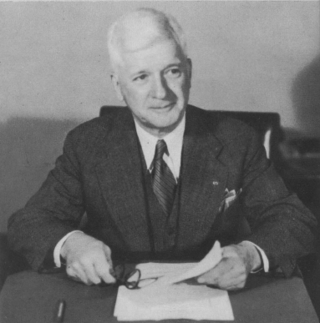
Robert Johnston McMullen was an American pastor, missionary, and academic administrator. A graduate of Centre College and Louisville Presbyterian Theological Seminary, he was licensed to preach in April 1909 and soon after left the country to begin a period of more than thirty years in Hangzhou, China. He worked as a Presbyterian missionary from 1911 to 1932 before joining the faculty of Hangchow Christian College and eventually becoming the school's president for a four-year term. After a seven-month detainment in a Japanese prison camp, McMullen returned to the United States in 1943 and was elected president of his alma mater the next year. He began in the role in September 1944 as "co-president" alongside Robert L. McLeod, who had been away since December 1942 as a chaplain in the United States Navy. The war having concluded, both McLeod and McMullen resigned in November 1945, though McMullen stayed at Centre as its lone president until the following October. After leaving Danville, he worked for the United Board for Christian Colleges in China before his 1953 retirement.

